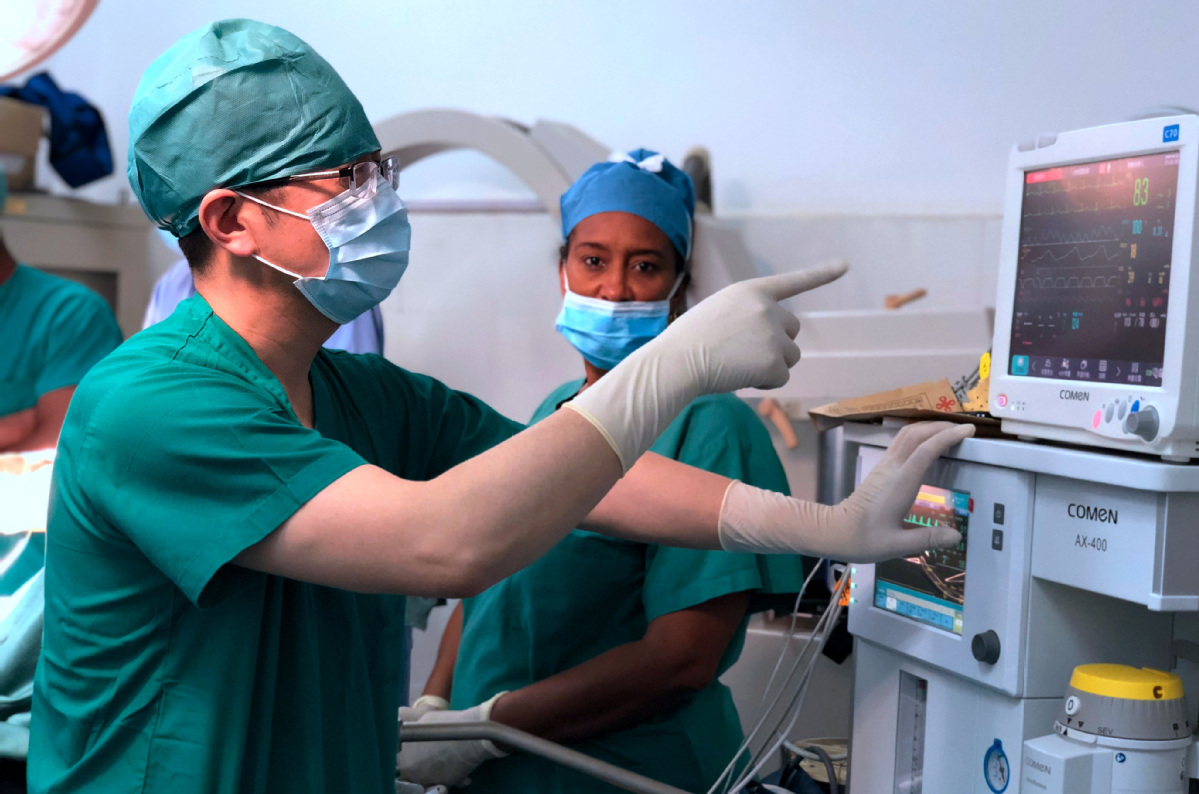 A Chinese volunteer (left) at the China-Guinea Friendship Hospital in Conakry, capital of Guinea, discusses a patient's condition with local medical professionals. Provided to China Daily
A Chinese volunteer (left) at the China-Guinea Friendship Hospital in Conakry, capital of Guinea, discusses a patient's condition with local medical professionals. Provided to China Daily
A growing number of medical professionals are offering their services to aid those most in need. Wang Xiaodong reports.
After working at a large, well-equipped hospital in Beijing, Chao Shuang could not have been more astonished by the conditions in Conakry, capital of Guinea, and the China-Guinea Friendship Hospital during her first visit to the West African country.
"I was prepared for the worst before I set out, but it turned out to be worse than I expected," she said. "There are virtually no roads in the city. The hospitals, even major ones in the capital, are in dire need of basic equipment. Some of the testing equipment was made in the 1970s, so most of us had no idea how to use the machines."
Chao, a pediatrician at Beijing Tsinghua Changgung Hospital, was part of an eight-strong team organized by the Chinese Medical Doctor Association. The Chinese medics - neurosurgeons, gynecologists and pediatricians from three tertiary hospitals in Beijing - provided voluntary services at the hospital in Guinea for three weeks.
They mainly treated children with hydrocephalus, a condition in which fluid accumulates in the brain. Though the illness is common in Guinea, the patients often had a serious form of the condition as a result of delayed diagnosis and treatment, according to Chao.
"Working there was completely different from working at my hospital in Beijing," she said. "We were constantly under pressure due to a lack of equipment, despite the things we had brought from China. The power supply in the operating rooms often failed, and sometimes the backup generator was also out of operation so we had to use the flashlights on our mobile phones to conduct surgery."
Moreover, none of the Chinese doctors could speak French, the official language of Guinea, so it was difficult to communicate with the patients.
Luckily, they met an interpreter who was working for a medical assistance squad dispatched by the Chinese government. The two groups shared the interpreter's services whenever possible, which was a great help, Chao said.
In addition to providing diagnoses and surgeries, her team also helped to train local medical professionals.
"I was pleased to see some of the children with serious conditions improved after we treated them," she said. "The experience was a spiritual baptism for me because I was finally able to help others in need, and I was so proud of myself."
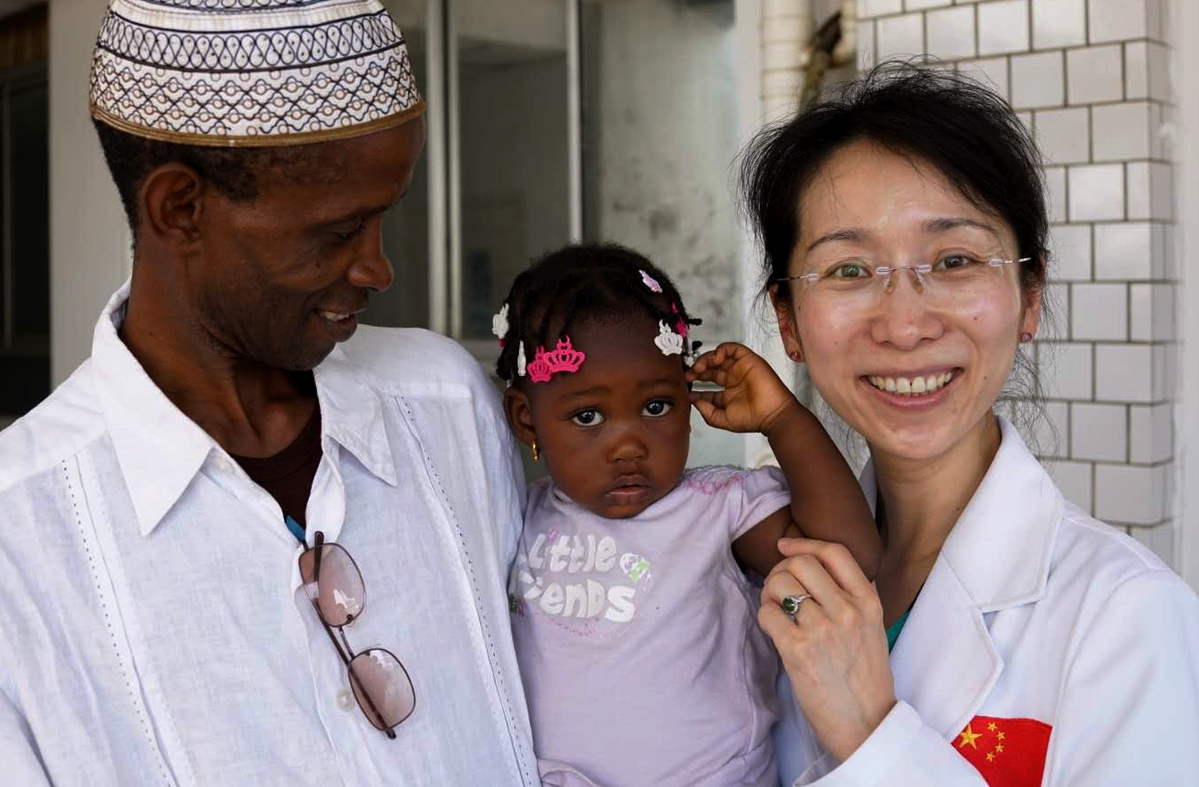 Chao Shuang (right), a pediatrician at Beijing Tsinghua Changgung Hospital, holds a child at the China-Guinea Friendship Hospital. Provided to China Daily
Chao Shuang (right), a pediatrician at Beijing Tsinghua Changgung Hospital, holds a child at the China-Guinea Friendship Hospital. Provided to China Daily
A popular choice
A growing number of Chinese physicians are choosing to provide voluntary services at home and abroad, aiming to help patients in vulnerable, poorer conditions.
Ling Feng, director of Chinese Medical Volunteer, a group administered by the Chinese Medical Doctor Association, said since CMV was founded in March 2017, more than 1,200 doctors have registered, and most of them work at large tertiary hospitals.
About 300 of them are qualified to provide voluntary services, and they have assisted in fields such as diagnosis and treatment, and the training of village doctors, according to Ling.
"The number of registered volunteers will keep rising, that's certain. I hope the total number will eventually reach 300,000," she said.
Chen Zhi, a doctor in the intensive care unit at Jiangxi Provincial People's Hospital in Nanchang, Jiangxi province, began seriously considering becoming a volunteer in 2016, when he was a visiting scholar at the University of Chicago in the United States.
At the time, he was temporarily free from his busy life as an ICU doctor, and having noticed various volunteer groups on campus, such as Doctors Without Borders, he saw the opportunity to lead a different existence.
"I found that after they had worked for two or three years, many young doctors in the US chose to join volunteer groups and travel to places such as Africa to provide medical services," he said.
"It made me think about doing more to help people in dire need, rather than simply pursuing my own career."
At the start of 2017, a colleague alerted Chen that the Chinese Medical Doctor Association was recruiting volunteers. He did not hesitate to enroll.
"The group's primary task is to train medical staff in less-developed regions and improve their skills, which is exactly what I wanted to do," he said.
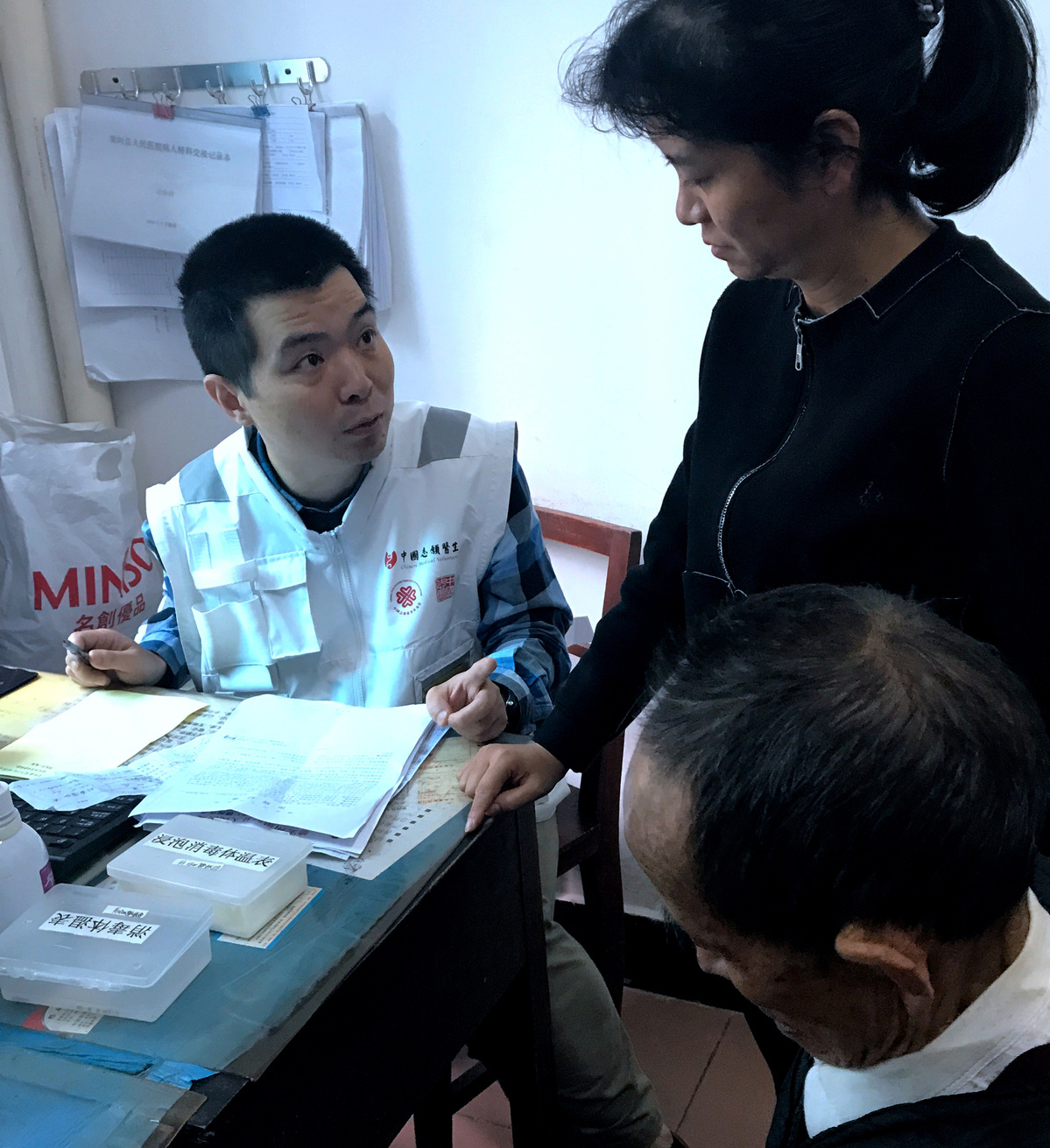 Chen Zhi, a physician who volunteers in his spare time, examines a patient at a hospital in the Dehong Dai and Jingpo autonomous prefecture, Yunnan province, in 2017. Provided to China Daily
Chen Zhi, a physician who volunteers in his spare time, examines a patient at a hospital in the Dehong Dai and Jingpo autonomous prefecture, Yunnan province, in 2017. Provided to China Daily
Poor resource distribution
The uneven distribution of medical resources in China means major hospitals in top-tier cities are crowded with patients from all over the country, while many smaller hospitals and grassroots clinics are shunned because they lack talented doctors.
Xin Hong, a gynecologist at the Second Hospital of Hebei Medical University in Shijiazhuang, capital of Hebei province, said many of the pregnant women with serious conditions she has diagnosed and treated have transferred from lower-level hospitals and clinics.
"I have seen many cases in which a mother or baby has died because of factors such as improper previous treatment," she said.
She added that better training would result in improved diagnosis and treatment at grassroots medical institutions, meaning fewer patients would have to be transferred to tertiary hospitals to receive emergency treatment.
Chen, from Jiangxi Provincial People's Hospital, said that during his first trip as a volunteer to the Dehong Dai and Jingpo autonomous prefecture in the southwestern province of Yunnan at the end of 2017, every hospital he visited in the prefecture and in three nearby counties had a shortage of experienced doctors.
"I think the hospitals are fairly well-equipped, as a result of investment by local authorities. The problem is the lack of talent. In one hospital, I saw an expensive high-end life-support machine, but it just lay idle because no one in the hospital knew how to use it," he said.
Last year, he visited four counties in the southern mountainous areas of Jiangxi, and discovered that their hospitals faced similar problems as those in Dehong.
Initially, Chen just waited to be notified and then went on missions with other volunteers. However, since the middle of last year he has worked as an organizer for the Chinese Medical Volunteer group and tried to recruit new members.
"In Jiangxi alone, there are a number of impoverished counties where we can make a contribution. However, there are only about 30 volunteer doctors in the province," he said.
"Most doctors in big city hospitals are very busy, so voluntary work is only possible during holidays or at weekends. Things would be much easier if we had enough volunteers."
Like most doctors in China, Chen is a full-time hospital employee, so he is unable to move around as freely as he would like.
"Luckily, my seniors at the hospital are supportive of my voluntary role. They always agree to requests if they do not interfere with my work," he said.
"I hope I can visit every impoverished county in Jiangxi within one to two years to get a general idea of the situation, and then I may try to mobilize our volunteer resources to cater to people's needs, so our work will be more targeted and effective."
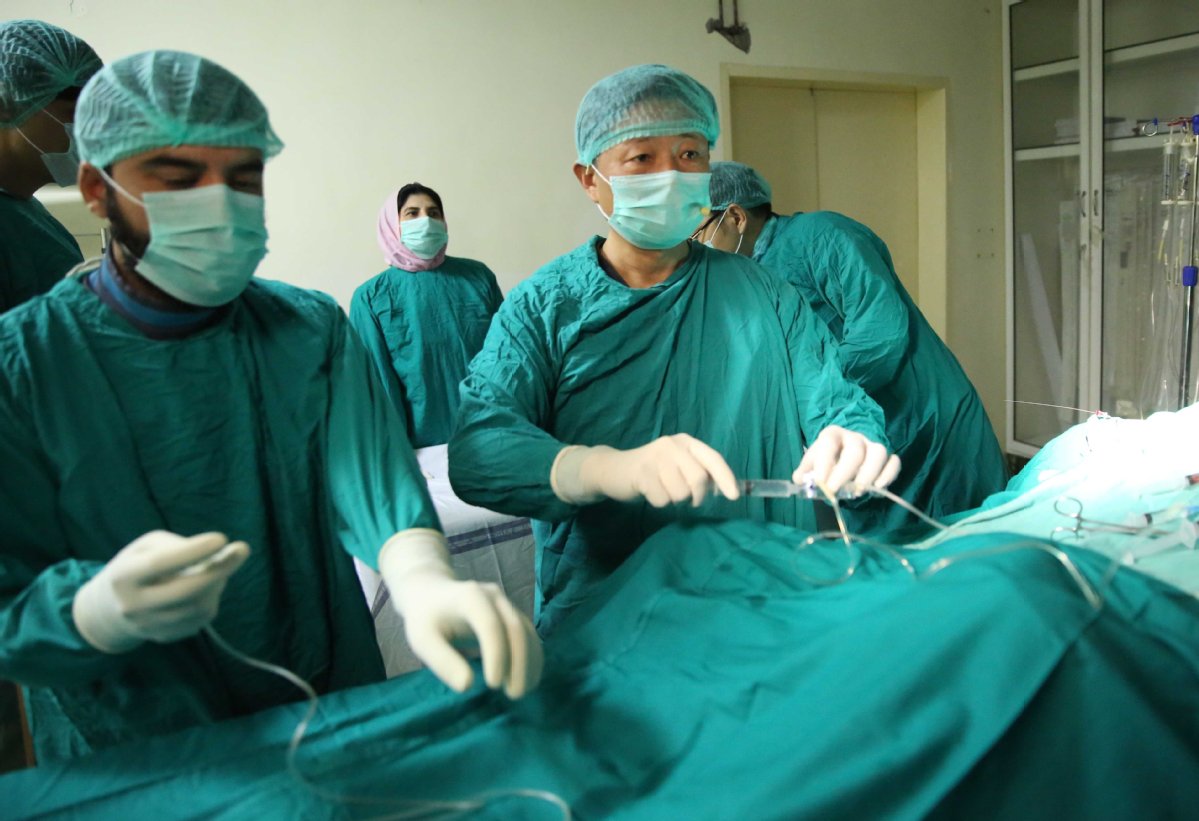 Wu Yongjian (right), a volunteer with the Chinese Academy of Medical Sciences in Beijing, performs a surgery with Pakistani doctors in Lahore. Provided to China Daily
Wu Yongjian (right), a volunteer with the Chinese Academy of Medical Sciences in Beijing, performs a surgery with Pakistani doctors in Lahore. Provided to China Daily
Poverty link
Ling, from Chinese Medical Volunteer, said the group's members will visit more than 200 impoverished counties nationwide this year to provide diagnoses and training.
"Illness is a major cause of poverty in many rural areas," she said. "We hope our voluntary work will make a contribution to improving health in these regions and help to eradicate poverty."
CMV members will also visit Ethiopia and Fiji. In Ethiopia, they will help to treat children with hydrocephalus, while in Fiji they will provide training for the diagnosis and treatment of strokes, a condition with a high incidence rate locally, Ling said.
"We are continuing to recruit new members, but with more overseas missions predicted in the future, we will need more financial support to bear the doctors' travel expenses," she said.
"At present, we receive some donations from the public and some from businesses, and we hope to get more support from the government in terms of payment for services."
Chao, the pediatrician from Beijing, said despite the harsh living and working conditions in Guinea, she would volunteer to visit again if she were given the opportunity.
"It is true that life is not as comfortable there, and each of us packed food, including instant noodles, and mosquito nets to prevent being bitten while asleep, but that doesn't matter. The patients there respect us so much and are so kind."
Just before she returned to China, Chao was deeply moved when the mother of a child with hydrocephalus she had treated gave her a shawl to wrap around her shoulders.
"I did not expect it, as she looked very poor," Chao said.
I am determined to continue offering my skills
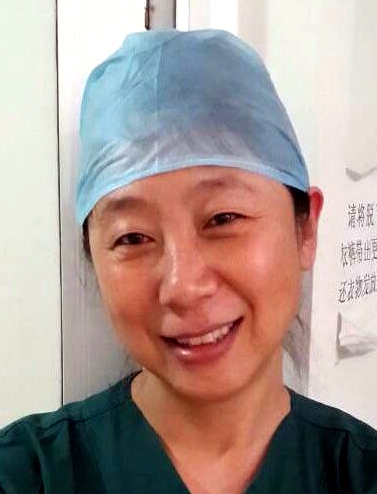
Xin Hong, obstetrician at the Second Hospital of Hebei Medical University. Provided to China Daily
As an obstetrician at a tertiary hospital, I see many patients who have been referred from grassroots medical institutions. Many have serious conditions due to factors such as improper diagnosis or treatment, or a lack of relevant knowledge. Some mothers lost their child or even died themselves.
That's why I want to do my share to help improve the skills of obstetricians in impoverished areas and provide better education about maternal healthcare.
Before I joined the Chinese Medical Doctor Association, I had volunteered five years in a row to visit impoverished counties on March 8-International Women's Day-and give lectures on maternal healthcare.
The trips were not easy, and some people in the counties could not understand why I had visited.
I told them I had volunteered to spread understanding of maternal healthcare, and I did not want any money.
So, in May 2017, when I saw a medical group message on WeChat saying the association was recruiting, I registered immediately. I felt I had finally found an organization I could be part of.
Since then, I have been to impoverished counties in provinces such as Guizhou, Anhui and Hebei.
The major hospitals in the counties were fitted with basic equipment thanks to local government investment, but some of the apparatus was not being used because none of the doctors were familiar with it.
Unlike major hospitals in big cities, county hospitals generally lack experienced, qualified doctors, and those that are there have few opportunities to visit other places to receive training.
Moreover, many local women don't understand proper maternal healthcare.
That results in them failing to detect conditions, so they don't visit the hospital until the problem is serious.
In addition to providing training for local medical staff, such as emergency midwifery and monitoring embryo's heartbeats, I also help to provide diagnoses or treatment for patients with serious conditions, at the urging of the local doctors.
A lack of anesthesiologists means pain-free natural births are not promoted in the hospitals, so I taught the medical staff alternative methods of relieving labor pains, such as using massage tools on the mother's back.
I have a full-time job at my hospital in Shijiazhuang, Hebei province, so I can only work as a volunteer at weekends or holidays, staying just a few days. Every time, I bring my laptop, so I can show videos and give slide presentations for training purposes.
Before I leave, I share my mobile phone number and WeChat details with the doctors in the hospitals. That means we can keep in touch after I return to Shijiazhuang in case they need any technical assistance or help with diagnosis and treatment.
During those few days of voluntary work, the schedule is always very tight. In the evenings, we volunteers share our experiences of the day. When we are on the bus returning to the airport, we share stories about our few days together. At that moment, all the fatigue leaves us and we are full of joy because we have helped patients in poor areas.
I am determined to continue offering voluntary services because my dream is to see mothers and babies safe in wards.
I hope pregnant women can be treated well in their hometowns, so fewer serious cases will have to be transferred to big city hospitals.
Xin Hong spoke with Wang Xiaodong.

